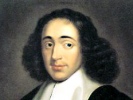
Sacred Texts Philosophy Spinoza Index Previous Next
Buy this Book at Amazon.com


Correspondence, by Benedict de Spinoza, [1883], at sacred-texts.com
Most sagacious Sir,—You have sent me just the answer I expected to receive, from a friend holding an opinion adverse to my own. But no matter. Friends may always disagree on indifferent subjects without injury to their friendship.
You ask me, before you gave an opinion as to what these spectres or spirits are, to tell you whether they are children, fools, or madmen, and you add that everything you have heard of them seems to have proceeded rather from the insane than the sane. It is a true proverb, which says that a preconceived opinion hinders the pursuit of truth.
I, then, believe that ghosts exist for the following reasons: first, because it appertains to the beauty and perfection of the universe, that they should; secondly, because it is probable that the Creator created them, as being more like Himself than are embodied creatures; thirdly, because as body exists without soul, soul exists without body; fourthly and lastly, because in the upper air, region, or space, I believe there is no obscure body without inhabitants of its own; consequently, that the measureless space between us and the stars is not empty, but thronged with spiritual inhabitants. Perhaps the highest and most remote are true spirits, whereas the lowest in the lowest region of the air are creatures of very thin and subtle substance, and also invisible. Thus I think there are spirits of all sorts, but, perhaps, none of the female sex.
This reasoning will in no wise convince those, who rashly believe that the world has been created by chance. Daily experience, if these reasons be dismissed, shows that there are spectres, and many stories, both new and old, are current about them. Such may be found in Plutarch's book "De viris illustribus," and in his other works; in Suetonius's "Lives of the Cæsars," also in Wierus's and Lavater's books about ghosts, where the subject is fully treated and illustrated from writers of all kinds. Cardano, celebrated for his learning, also speaks of them in his books "De
[paragraph continues] Subtilitate," "De Varietate," and in his "Life;" showing, by experience, that they have appeared to himself, his relations and friends. Melancthon, a wise man and a lover of truth, testifies to his experience of them, as also do many others. A certain burgomaster, learned and wise, who is still living, once told me that he heard by night the noise of working in his mother's brew-house, going on just as it does while beer is being brewed in the day; this he attested as having occurred frequently. The same sort of thing has happened to me, and will never fade from my memory; hence I am convinced by the above-mentioned experiences and reasons, that there are ghosts.
As for evil spirits, who torture wretched men in this life and the next, and who work spells, I believe the stories of them to be fables. In treatises about spirits you will find a host of details. Besides those I have cited, you may refer to Pliny the younger, bk. vii., the letter to Sura; Suetonius, "Life of Julius Cæsar," ch. xxxii.; Valerius Maximus, I. viii. §§ 7, 8; and Alexander ab Alexandro, "Dies Geniales." I am sure these books are accessible to you. I say nothing of monks and priests, for they relate so many tales of souls and evil spirits, or as I should rather say of spectres, that the reader becomes wearied with their abundance. Thymus, a Jesuit, in the book about the apparition of spirits, also treats of the question. But these last-named discourse on such subjects merely for the sake of gain, and to prove that purgatory is not so bad as is supposed, thus treating the question as a mine, from which they dig up plenteous store of gold and silver. But the same cannot be said of the writers mentioned previously, and other moderns, who merit greater credit from their absence of bias.
As an answer to the passage in your letter, where you speak of fools and madmen, I subjoin this sentence from the learned Lavater, who ends with it his first book on ghosts or spectres. "He who is bold enough to gainsay so many witnesses, both ancient and modern, seems to me unworthy of credit. For as it is a mark of frivolity to lend incontinent credence to everyone who says he has seen a ghost; so, on the other hand, rashly and flatly to contradict so many trustworthy historians, Fathers, and other persons
placed in authority would argue a remarkable shamelessness."
21 Sept., 1674